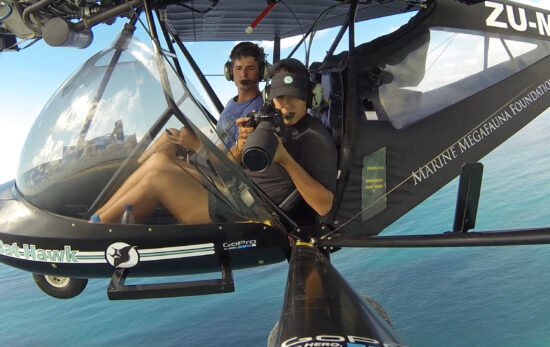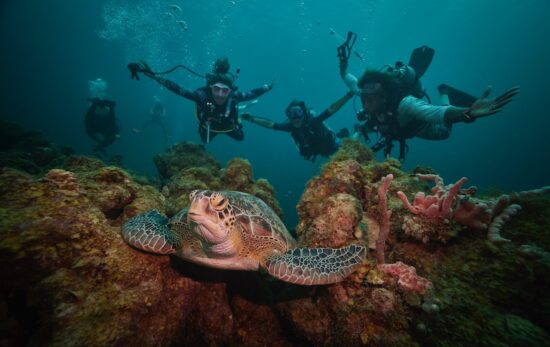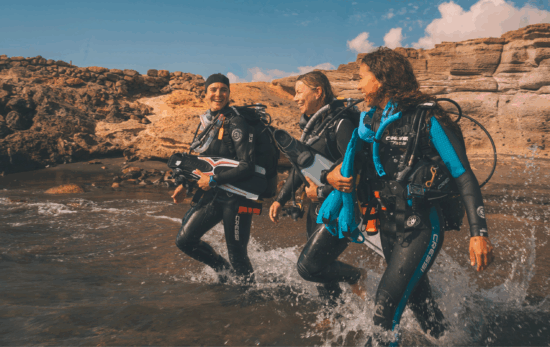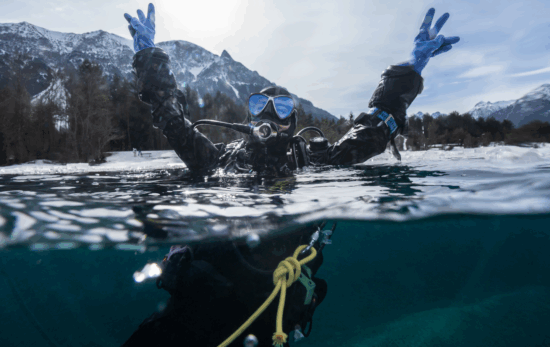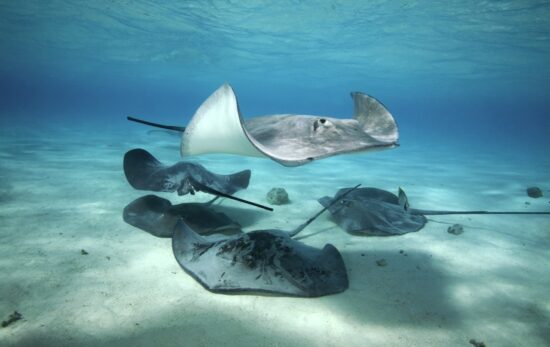For many PADI Pros, diving has been part of their life since the moment they were old enough to become certified. And for some, scuba diving was a way to connect with a friend or family member but eventually became their passion. Often you hear about newly certified divers getting bit by the “scuba bug” and wondering how they can turn their newfound passion into a career and what jobs you can get as a PADI Professional. Being a professional diver isn’t just about teaching people to dive and guiding fun dives. Read on to learn from five PADI Pros on where scuba diving has taken them.
Tim Lawrence
Passionate tec diver, wreck hunter and dive shop owner.
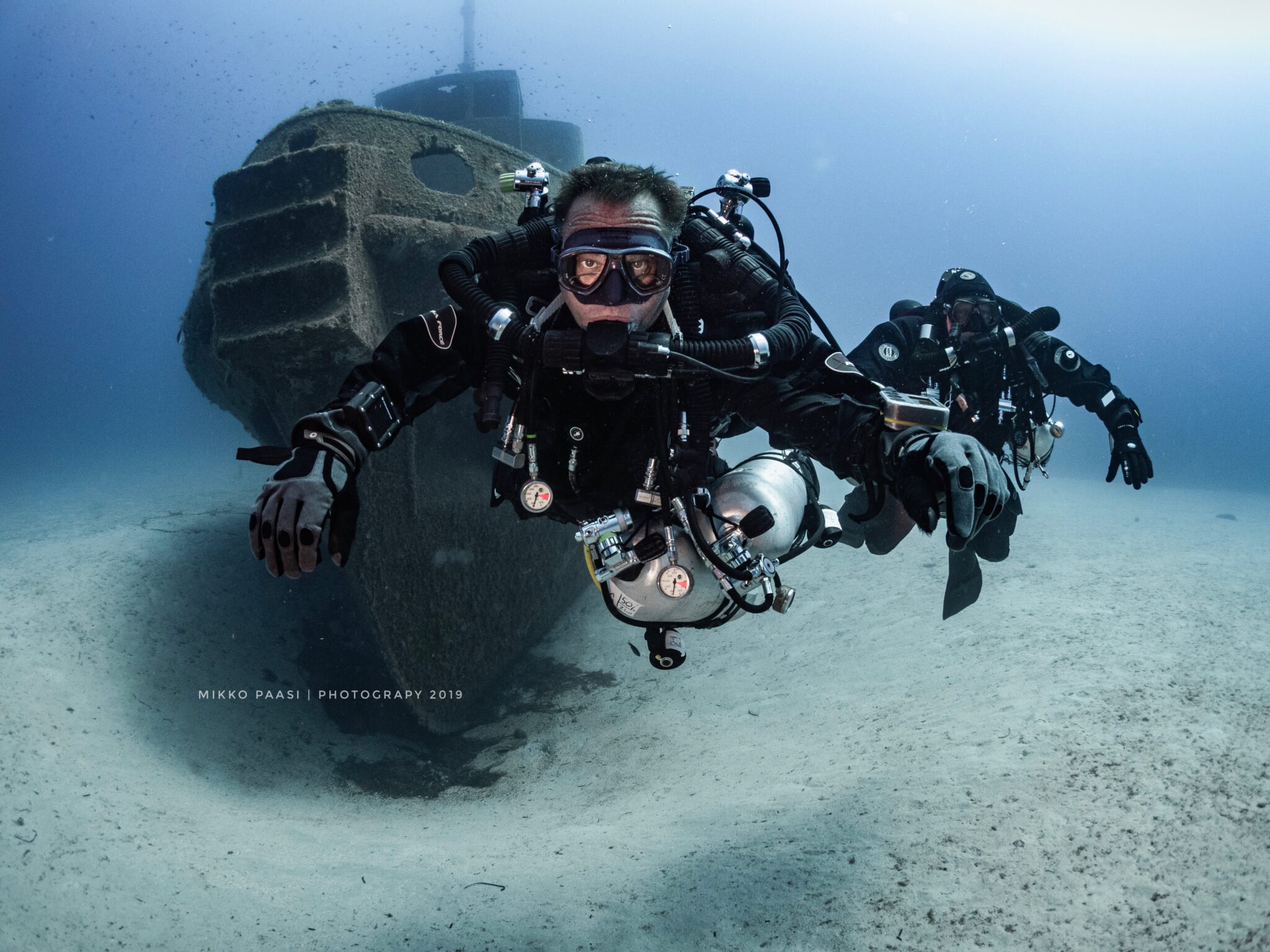
Q: When did you get dive certified, and why?
A: I was first certified in Dorset around 1994 at the suggestion of my uncle, Burnard Eaton (cofounder of Diver magazine). My intention from the get-go was to pursue a career in diving.
Q: What was your first dive job?
A: My first dive job was working at Sid’s in Samui with Cesar Bennelli.
Q: What interested you in tec diving and led you to open your dive shop?
A: I became interested in tec diving while working in the Solomon Islands in 1995. The thought of exploring captivated me. During one of my early adventures, I vividly remember seeing a meat cleaver bedded into the top of the general mess table at 67 meters on a WWII shipwreck called the Aaron Ward. In my mind, I imagined the last defiant act of the ship’s cook as he left his station to abandon the boat. That moment in time was captured and I was hooked!
Q: Tell me more about wreck hunting and the excursions you lead to find missing vessels.
A: All shipwrecks have a story to tell. Human error, weather, or war. A series of events that turn in a moment what would have been a standard passage into a life-changing experience. Discovering these stories and writing about them has developed into a passion of mine, driven by the need to fill in the blanks in my understanding of the sea. Although I’m fascinated by trade history in this region, I’m currently involved with projects that bring light to an otherwise forgotten theatre of war – The Sea of Siam. The human aspects on both sides drive the lunacy of war home to me.
Q: What has been your most unique diving experience?
A: I have been fortunate to have had many unique experiences in diving, finding Roman shipwrecks in the straights of Gibraltar, locating WWII wrecks in Asia and correctly identifying mistaken shipwrecks. All these experiences have one thing in common and, simultaneously, are unique. The journey and the people I have been lucky enough to have shared it with.
Q: What does the dive life mean to you?
A: The ability to travel, explore, and discover has been gifted to me due to my passion in diving. The freedom to pursue this passion has meant that I have never had to struggle to get out of bed in the morning.
Q: Where would you be today if you hadn’t started diving?
A: If I hadn’t begun diving, I would like to think I would have still pursued another career on the ocean. To quote Jacques Cousteau, “The sea, once it casts its spell, holds one in its wonder forever.”
Ahmed Fouad
PADI Instructor and founder and director of RED SEA PROJECT™
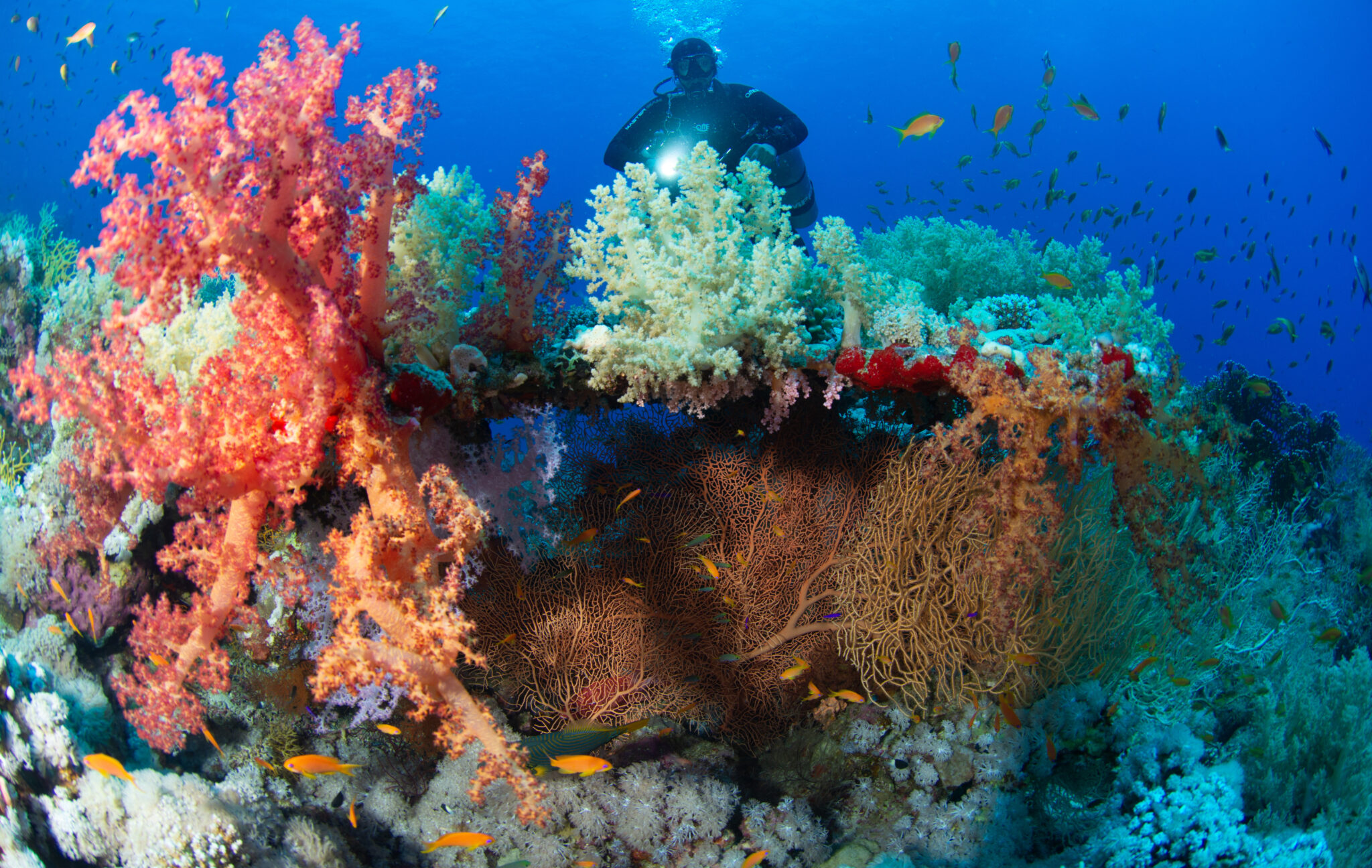
Q: When did you get dive certified and why?
A: I started diving when I was 12 years old and became a PADI Professional in 2006. I was living in Sinai and volunteering in marine conservation programs that also included diving and snorkeling.
Q: What was your first dive job?
A: My first dive job was as a PADI Divemaster in Dahab, South Sinai. Shortly after, I moved to Marsa Alam in the southern Red Sea and have been there ever since.
Q: What made you decide to become a PADI instructor?
A: I have a passion for education and dedicate my time to help others fulfill their potential. I decided to make diving my career and support others in their journey to become professional divers.
Q: What has been your most unique diving experience?
A: Returning to diving after a few months of lockdown. It was a Dive Against Debris in a harbor that is located within a few minutes’ walk from where I live in Marsa Alam. We collected over 20 tons of marine debris!
Q: You are very active in the marine conservation space, tell us what projects you are currently working on?
A: Throughout the years I have worked closely with different governmental and civil society organizations, at all levels on biodiversity and ecosystems resilience, environmental protection, environmental mitigation, marine and land conservation. I’ve been involved in several evaluations intended to identify environmental compliance and management systems implementation gaps in the Red Sea and Gulf of Aqaba.
I’m also a Commission Member of the World Commission on Protected Areas of the IUCN – the International Union for Conservation of Nature who specializes in Management Effectiveness Networks, Marine Networks, North Africa, West Asia and Middle East Region, Tourism and Protected Areas Networks and IUCN WCPA-SSC Biodiversity and Protected Areas Networks.
In addition, I am active in international policy forums related to coral reef and marine ecosystems management and ecological resilience and have served on both local and regional projects to support national parks and protected areas.
I am the founder and director of RED SEA PROJECT™, an international organization dedicated to protecting and preserving our most precious marine environments and the species that inhabit them.
The volunteer-based team I lead works daily with scientists, divers and local communities at projects that range from educational outreach in schools to megafauna research projects.
Q: Where do you think you would be today if you hadn’t started diving?
A: Probably working as a park ranger or guide in a land or marine protected area or a national park.
Jillian Morris
PADI Divemaster, Scuba Diving Sea Hero and Sharks4Kids Founder
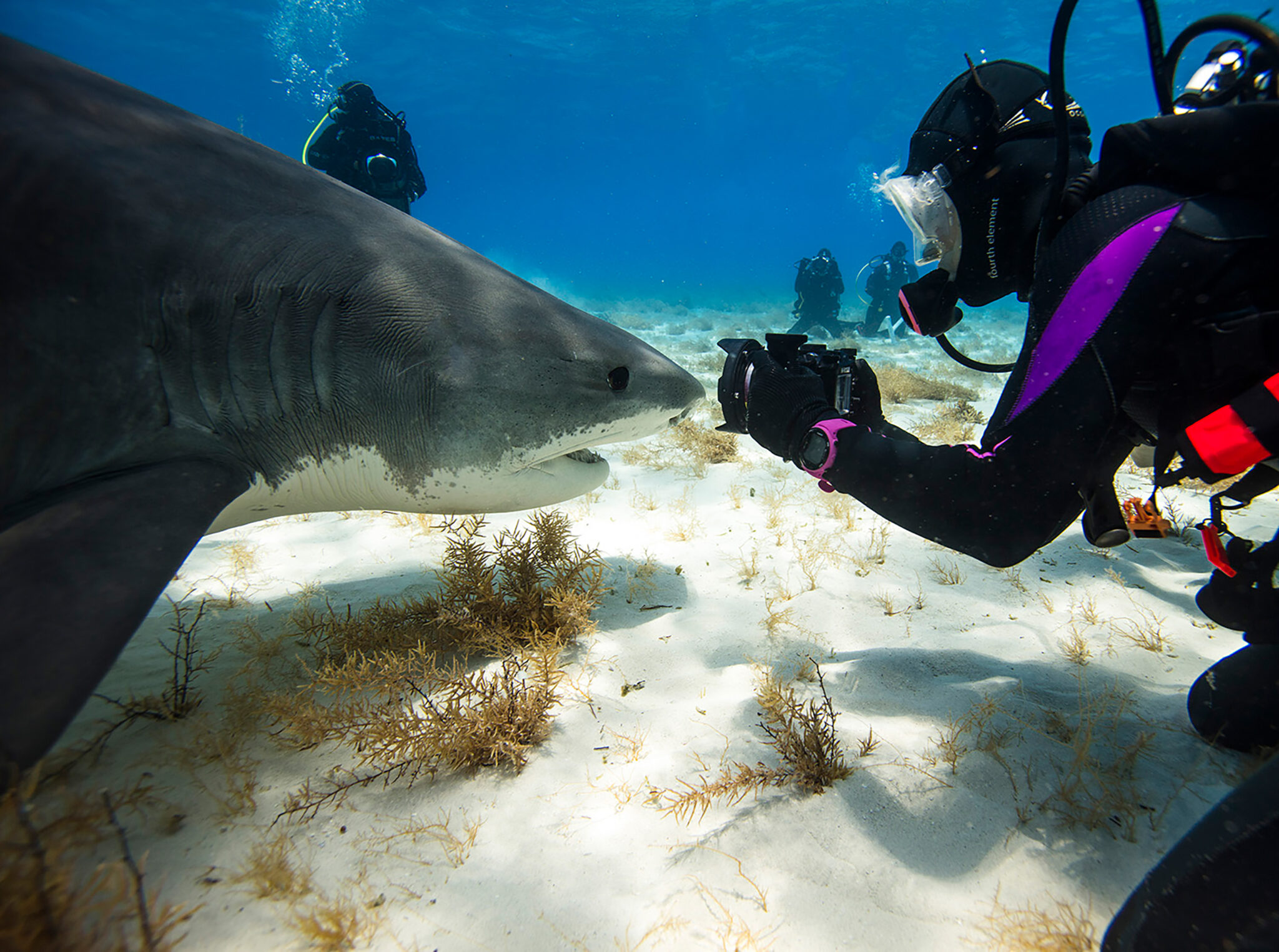
Q: When did you get dive certified and why?
A: In 2004, which was much later than I had wanted. I grew up in a small town in Maine and before heading off to university, there were no real options to get certified. I got certified in Kennebunkport, Maine in March, and wow, was it cold! This experience really changed my life and I am forever grateful for my instructor and for learning to dive in cold water!
Q: What was your first dive job?
A: I worked on a research support vessel and gained a lot of skills in diving and science, which in turn helped me get my first dive job. I taught scuba in the Fort Lauderdale area for a couple of years.
Q: What made you decide to become a PADI Pro?
A: Having more advanced skills for diving became really important. I wanted to share the underwater world with others, but I also wanted to enhance my skills and training. Even if you don’t want to teach, having those advanced skills and learning makes you a better diver. It has also really helped with my research and my underwater photography skills.
Q: You are passionate about shark conservation and advocacy, what are you currently working on?
A: My main focus is always education, as it really is critical for conservation. Currently, I’m developing three new regional programs for Sharks4Kids, a video series and prepping for three large outreach events. It’s a very busy time of year, but I love it!
Q: You created Sharks4Kids to promote the education and protection of sharks. What led you to start this organization?
A: After traveling to work on various shark research and dive projects, I had friends asking me to speak to their students. I started visiting schools and loved it. Every time I left a school I had hope and felt inspired. I decided to create resources and opportunities to help kids learn about these animals, but also empower them to speak up and make change. Kids are far more powerful than they realize and they can make an impact.
Q: How does your uniqueness as a woman, and now mom, help you to succeed in the conservation space?
A: For conservation to be successful and sustainable, we need diverse voices. My perspective, knowledge and experience brings something to the table that others cannot, just like their voices are unique. Becoming a mom has also made me think more about what my daughter’s future will look like. I want her to love the ocean (and hopefully sharks), but I also want her to realize we are all connected and we are connected to the ocean.
Q: Where do you think you would be today if you hadn’t started diving?
A: I assume it would be a similar path because I have always been obsessed with the ocean. I told my parents I wanted to be a marine biologist when I was five. Diving has opened so many doors though. I have learned more about the ocean, met really incredible people and been involved in some amazing projects. It’s helped me understand why I am fighting so hard to save sharks and educate the world about them. Also, being in the ocean is a gift; it’s really magical. It’s my work, but it’s also where I can clear my head and just find joy.
Jack Fishman
PADI Course Director and Community & Campaigns Manager at PADI AWARE Foundation
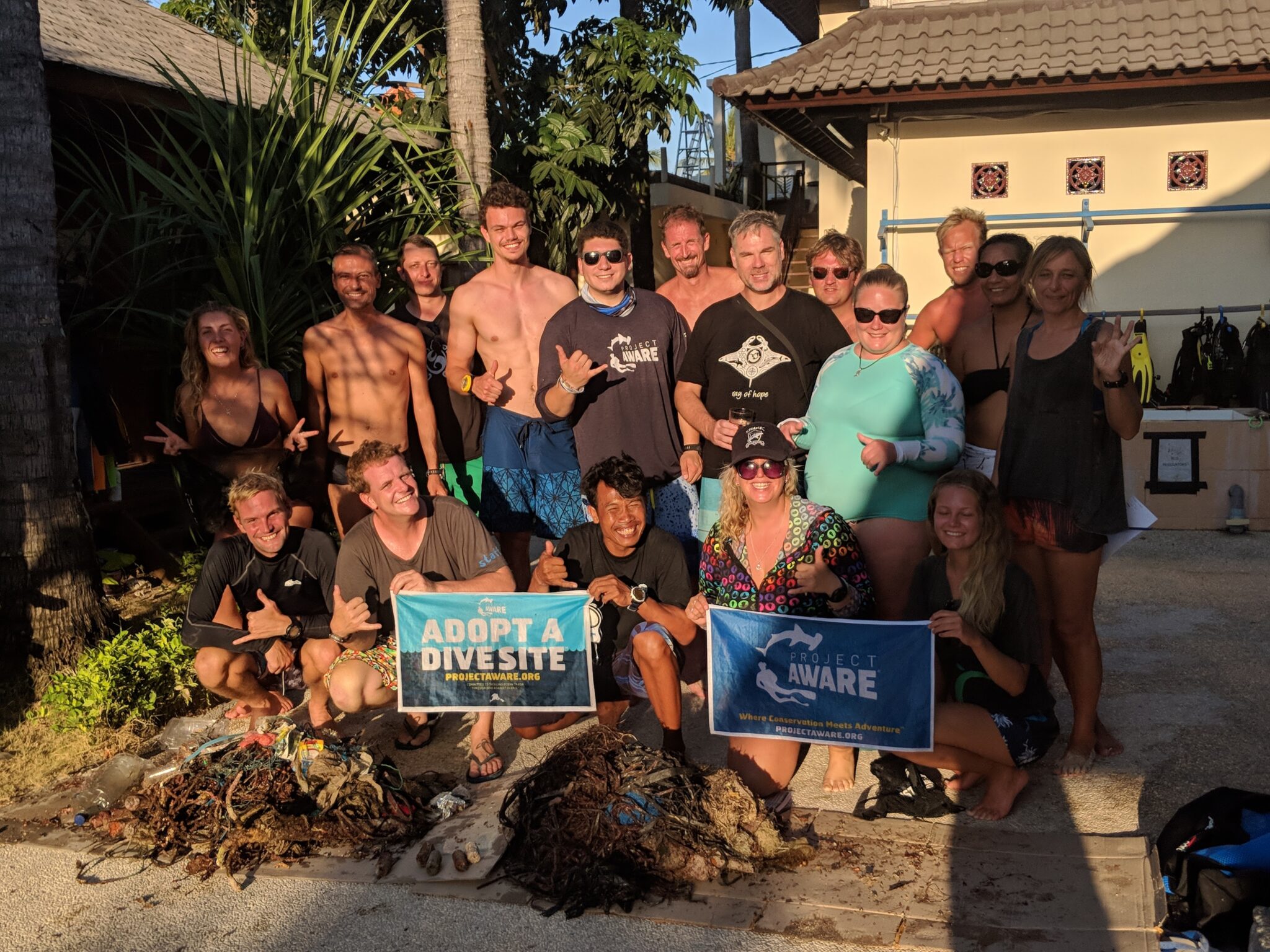
Q: When did you get certified and why?
A: I got certified in 1999. Diving was a journey that was inspired directly by my father. It was a part of our family personality. I was very young, (just 8 years old!). One of the first fish I remember seeing was this vibrant French Angelfish with a broken beak. He would hang around the shallows, and I felt I was able to connect with him as well! From that moment, I knew this was a world I wanted to explore and protect.
Q: What was your first dive job?
A: My first dive job was with Lowcountry Scuba in Shem Creek, South Carolina. It was a beautiful place with freshwater lakes for open water training and offshore rocky reefs to discover the local wildlife.
Q: What inspired your love of conservation?
A: For me, it started with questions I simply didn’t have the answers to. When I was young I would scuba dive and snorkel at some of the same dive sites year after year. I noticed quickly that I had trouble finding the same coral head or same fish as the years progressed. This initial confusion, while innocent at first, quickly stemmed into a strong determination to seek the answers, and ultimately solutions to many of the conservation issues we know and fight for today.
As I could see and feel these “questions”, and I knew that it was important to dedicate my life to learning the answers and working with others to find solutions to protect what we love in the aquatic world. This journey of answer-seeking has led to some of the most amazing connections and adventures I could ever dream of.
Q: How did you go from a dive instructor in the Florida Keys to working for PADI Aware?
A: For me, it was a long process. I started my professional conservation career as a humble R.E.E.F. (Reef Environmental Education Foundation) Intern. I learned the value of grassroots conservation efforts and as a PADI Scuba Instructor, I knew we had an obligation to take others under the water to understand exciting ways to make citizen science surveys more than just purposeful diving, but a destination as well.
I worked at Rainbow Reef Dive Center in the Florida Keys for four years. During that time, I watched closely how a busy dive operation problem solves and creates sustainable solutions to otherwise mundane problems. Over the years I became the Conservation Coordinator and used that title to create local partnerships between key stakeholders in the Florida Keys Community.
Those partnerships led to incredible policy change opportunities through the combined efforts of the NOAA (National Oceanic Atmospheric Association) and local dive centers to tackle marine debris, such as fishing traps and pots. As a community, we created change in the dive industry in Florida. I leveraged the business elements and lessons learned to harness the excitement and passion of dive professionals around the world to bring conservation actions to their dive businesses. This is how I came to PADI. I petitioned the team to expand the work and moved to California shortly after to begin my dream of working for PADI and PADI AWARE!
Q: What has been your most unique diving experience?
A: I think by far it was diving in whitewater rapids in New Zealand. It was an opportunity led safely by one of the local tour operators. The currents were insane and it really felt like we were flying through the water. Wearing extra safety gear as well as coordinating with the safety services on land following us was an extra challenge, but extremely rewarding. The water was so clear and so cold! But you really get to feel like superman down there.
Q: Where do you think you would be today if you hadn’t started diving?
A: Funny enough diving was the passion that evolved most through my journey as a young kid. However one of my other passions is working in technical theater and local productions! I loved building sets and props for theater departments and while wildly different, there is a similar sense of community and passion in that theater world! Certainly would be even cooler to combine those passions one day!
Being a PADI Pro can take you to new heights as a dive instructor, conservationist or explorer. There are so many different paths you can take once you become a PADI Divemaster or Instructor. Read more about the professional level courses available by clicking the button below.
